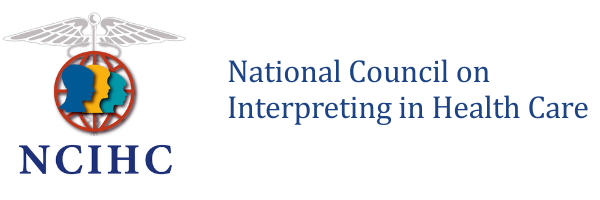- Home
- About
- Mission, Goals and Values
- Board of Directors
- Committees and Work Groups
- Executive Committee
- Standards and Training Committee
- Outreach and Membership Committee
- Policy, Education, Research Committee
- Finance Committee
- Organizational Development Committee
- Nominating Committee
- National Ethics and Standards Work Group
- Home For Trainers Webinar Work Group
- Languages of Limited Diffusion Work Group
- Congress Planning Work Group
- NCIHC On The Road Work Group
- Social Media Work Group
- Policy Work Group
- Education Work Group
- Research Work Group
- Journal Work Group
- Donate to NCIHC
- Founders Wall
- NCIHC History
- Volunteer for NCIHC
- FAQ - NCIHC Information
- Membership
- Ethics & Standards
- Resources
- Training and Events
- NCIHC Publications
- Other Resources
- Archives
History of Healthcare Interpreter Code of Ethics and Standards of Practice2018 Post AMM Workshop - Challenges in Standards of Practice: Advocacy and Role Boundaries Did you miss the post-AMM workshop, "Challenges in Standards of Practice: Advocacy and Role Boundaries"? Did you attend and are interested in the PowerPoint? Click above to access STC's discussion of two challenging Standards of Practice and useful techniques in applying these standards to everyday practice. (*For those who did not attend, please note that several slides may not be fully understood as they represent stand-alone graphs or pictures that were discussed in the workshop.) Should you have any questions, please feel free to contact us at: [email protected].
Co-funded by The Commonwealth Fund and The California Endowment, the standards were developed through a national consensus-building process that included focus groups and surveys of hundreds of working health care interpreters from across the United States over a two-year period. State and regional organizations also participated. "This is the first set of national standards of practice developed by professionals in medical interpreting, derived from well-established practices in California and Massachusetts," said Commonwealth Fund Senior Program Officer Anne C. Beal, M.D. "Adopting these standards nationwide will be key to efforts to enhance professionalism in the field, improve quality of care, promote communication between patients and physicians, and reduce errors." Health care interpreting, where a bilingual professional facilitates communication between health care providers and patients, is a distinctive and specialized area of interpreting practice. Although in recent years health care facilities and agencies across the United States have made strides in providing linguistically appropriate services, the lack of qualified interpreters remains a barrier for patients with limited English proficiency. To date, no national body has provided clear, consistent definitions of the characteristics and competencies of a qualified health care interpreter, leaving interpreters, health care facilities and others with little or no guidance on the qualifications and proper role of the interpreter. As a result, the quality of health care interpreting across the country is uneven and inconsistent, leading to potentially incomplete, inaccurate and dangerous communication. The clinical and financial ramifications of such poor communication are well documented in the professional literature. "These national standards will ensure the highest quality of health care interpreting when adopted by hospitals, health plans and health systems for assessment, training and ultimately, certification, of health care interpreters. They are a major advancement towards the integration of health care interpreters as vital members of health care teams," said California Endowment Program Director Ignatius Bau. Some Specifics on the Standards The NCIHC's National Standards of Practice are designed to help improve the quality and consistency of interpreting in health care. Just like clinical protocols for physicians, these new standards will provide guidance as to what is expected of health care interpreters and what constitutes good practice. "These standards provide a common base of understanding of our profession and foster consistency in its practice, thus improving the quality of interpreter services across the United States," said NCIHC Board Co-Chair Wilma Alvarado-Little, M.A. In addition to the focus groups and surveys used to develop the standards, two state organizations and their work were especially helpful -- the California Standards for Healthcare Interpreters: Ethical Principles, Protocols, and Guidance on Roles & Intervention developed by the California Healthcare Interpreting Association (CHIA), and the Medical Interpreting Standards of Practice developed by the Massachusetts Medical Interpreters Association (MMIA) and The Education Development Center. Endorsements The National Code of Ethics and Standards of Practice have been endorsed by an array of organizations. Click here to view the full listing of endorsing organizations, or to learn more about becoming an endorser.
|
